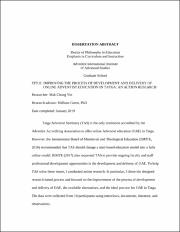Improving the process of development and delivery of online Adventist education in Tatga : an action research
Abstract
Tatga Adventist Seminary (TAS) is the only institution accredited by the Adventist Accrediting Association to offer online Adventist education (OAE) in Tatga. However, the International Board of Ministerial and Theological Education (IBMTE, 2016) recommended that TAS should change a mail-based education model into a fully online model. IBMTE (2017) also requested TAS to provide ongoing faculty and staff professional development opportunities in the development and delivery of OAE. To help TAS solve these issues, I conducted action research. In particular, I chose the designed research-based process and focused on the improvement of the process of development and delivery of OAE, the available alternatives, and the ideal practice for OAE in Tatga. The data were collected from 10 participants using interviews, documents, literature, and observations.
The findings show that the designed research-based process should be the analysis, design, development, evaluation, and implementation (ADDIE) and evidence-based practice (EBP) model—ADDIE+EBP model focusing on the course (design, content, and implementation) and interactivity. The process of development and delivery of OAE can be improved by considering the improvement plan, context, facilitators, continuous support, periodic improvement, and professional training. The available alternatives to plan, develop, implement, and continually improve the operation of OAE include video and audio support and video conferencing. The practice of OAE can be ideal if it (a) has an online library, compassionate facilitators, pre-class work, and student motivation, and (b) consider the needs of the church.
To meet the contextual needs of TAS, 10 new actions should be implemented in the future. These are (a) onsite student orientation, (b) a pre-class needs assessment, (c) collecting feedback from the local church, (d) recommending students the use of a virtual private network, (e) praying to God for protection, (f) conducting leadership training, (g) building strong and inspiring leadership, (h) creating a replacement plan for equipping qualified development and delivery team members, (i) providing a greater variety of learning modalities, and (h) establishing a research committee. The latter will help properly implement the applicable model (a combination of research-based evidence and contextual feedback) for OAE in Tatga.


